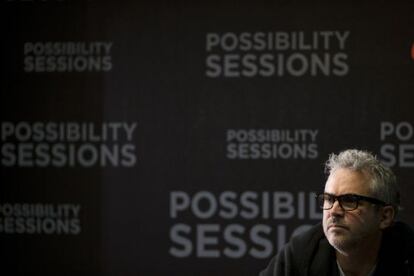Filmmaker challenges Mexican president to TV debate on energy reform
Influential director Alfonso Cuarón presents government with questions about liberalization plans


The Mexican filmmaker Alfonso Cuarón has become the visible face of a movement that is questioning the government’s plans for energy reform.
A week ago, the director, who won an Academy Award for Gravity, sent Enrique Peña Nieto a list of 10 questions. The president’s team came up with answers in a matter of hours, reflecting how important the matter is to the Institutional Revolutionary Party (PRI) administration.
Cuarón had confronted Peña Nieto about his approval, without prior social debate, of a law that opens the door to foreign companies wishing to drill for oil in Mexico.
On Monday Cuarón took up the issue once more and challenged the president to a live television debate in a primetime slot, and including speakers with opposing views and representatives from all political parties.
In a letter published on a website dedicated to the energy debate, the filmmaker considers there is a greater need than ever for an “elevated discussion” on the reforms affecting Pemex, the state monopoly since the industry’s nationalization more than 75 years ago by General Lázaro Cárdenas del Río. Back then, the expulsion of foreign oil companies was viewed as an act of national reaffirmation and the subject of oil continues to be a sensitive issue in Mexico.
Is it a lot to ask? Three debates that citizens can understand?” Filmmaker Alfonso Cuarón
“Is it a lot to ask? Three debates that citizens can understand, which will allow them to compare the various points of view on such a nation-transforming reform, on the Mexico of all Mexicans?” he asks in the letter.
The ball is now in Peña Nieto’s court. But Cuarón has already achieved what part of Mexico’s left, headed by Andrés Manuel López Obrador, failed to do: get the president’s attention. The government remained unmoved by the thousands of people who protested the reform in Mexico City, and the legislative proposal continued on its way through the Senate and Congress.
The Party of the Democratic Revolution (PRD), the most relevant left-wing group, even asked for the reform to be put to a popular referendum, and several intellectuals backed this idea. But the government turned a blind eye.
By comparison, the fast reaction to Cuarón’s questions suggests that the filmmaker – who was recently named one of the world’s most influential people by Time magazine — is someone who does deserve an explanation.
If Peña Nieto were to agree to a televised debate, it would be a historic occasion. Mexican presidents, particularly during the PRI’s 70-year uninterrupted rule, were out of reach to the average citizen, and very rarely did they submit themselves to the will of the people.
Mexican presidents were of reach for the average citizen, and rarely submit themselves to the will of the people
But there is a deadline to any potential debate on energy reform, which is part of Peña Nieto’s broader plans for modernizing Mexico. The government is planning to get secondary legislation passed before July, so any televised debate would have to get organized immediately.
To Mexicans, energy reform is an existential dilemma. Supporters feel that foreign private companies, which have better technology than Pemex, will be able to drill more and to a greater depth, paying Mexico more in taxes. This system works well in other countries, such as Brazil and Norway.
Detractors claim that Pemex could do a better job all by itself if it didn’t have to pay so much tax, and doubt that a more open market will benefit anyone else save a few multinationals.
The country’s economic growth is also at stake. If reforms are approved, Energy State Secretary Joaquín Coldwell estimates that GDP would steadily grow at a rate of one percent a year until 2018, when Peña Nieto’s term ends. After that, the economy would post two percent growth until 2025.
In the past, other reforms and privatizations were presented as a boon to society, but ended up creating a small class of very wealthy, very privileged individuals, some of whose members are among the richest men in the world. The middle class and the poor did not benefit as expected. Opponents of the current reform fear that things will turn out no different this time.
Tu suscripción se está usando en otro dispositivo
¿Quieres añadir otro usuario a tu suscripción?
Si continúas leyendo en este dispositivo, no se podrá leer en el otro.
FlechaTu suscripción se está usando en otro dispositivo y solo puedes acceder a EL PAÍS desde un dispositivo a la vez.
Si quieres compartir tu cuenta, cambia tu suscripción a la modalidad Premium, así podrás añadir otro usuario. Cada uno accederá con su propia cuenta de email, lo que os permitirá personalizar vuestra experiencia en EL PAÍS.
En el caso de no saber quién está usando tu cuenta, te recomendamos cambiar tu contraseña aquí.
Si decides continuar compartiendo tu cuenta, este mensaje se mostrará en tu dispositivo y en el de la otra persona que está usando tu cuenta de forma indefinida, afectando a tu experiencia de lectura. Puedes consultar aquí los términos y condiciones de la suscripción digital.








































